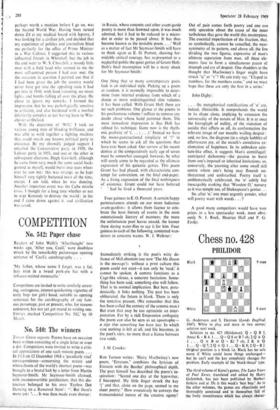No. 540: The winners
Trevor Grove reports: Poems have on occasion been written consisting of a single letter or even a dot. Competitors were invited to write a criti- cal appreciation of one such minute poem. . . . In TLS on 12 December 1968 a 'peculiarly vital' correspondence—concerning the nature and whereabouts of the world's shortest poem—was brought to a brutal halt by a letter from Martin Seymour-Smith. Mr Seymour-Smith claimed, with incontrovertible justification, that this dis- tinction belonged to his own 'Eyeless Dot Dancing on a Removed Stem': But there's more yet: `... It was then made even shorter: in Russia, where concrete and other avant-garde poetry is more than frowned upon, it was much admired, but it had to be reduced to a micro- dot in order to be passed about. It has thus become known as the invisible poem. . . Well as a matter of fact Mr Seymour-Smith will have to think again as E. 0. Parrott, showing for- midable critical courage, has re-presented to a neglectful public the quiet genius of Grunt Holt; Holt's final masterpiece will be a nasty shock for Mr Seymour-Smith: One thing that so many contemporary poets lack is an individual style. Picking up a poem at random, it is normally impossible to deter- mine from internal evidence from which of a dozen or more undistinguished slim volumes it has been culled. With Grunt Holt there are no such problems. One glance at the poems in his posthumous volume ! suffices to remove any doubt about whose hand pennned them. The most immediate impression is that Holt has refined his technique. Gone now is the rhyth- mic prolixity of '(. . . ; . . .).' Instead we have the mono-punctuational simplicity of "?' in which he seems to ask all the questions that have ever been asked. Our sorrow at his recent demise at the comparatively early age of seven must be somewhat assuaged. however, by what will surely come to be regarded as the ultimate expression of his quixotic genius. This poem Grunt has had placed, with characteristic con- tempt for convention, on the final end-paper. As a living expression of the final nothingness of existence, Grunt could not have bettered " had he lived a thousand years.
Four guineas to E. 0. Parrott. A certain happy permissiveness attends on our more ludicrous avant-gardists: it allows them licence to cele- brate the least literary of events in the most ostentatiously literary of manners; the more the unfortunate poet leaves unsaid, the keener these daring water-flies to say it for him. Four guineas to each of the following, contented wan- derers in concrete wastes. W. J. Webster:
7
Immediately striking is the poet's witty de- fiance of McLuhanism (see now 'The Me Deum is the message'): without a print culture this poem could not exist—it can only be 'read,' it cannot be spoken. A comma functions as a Cage-like silence, a concrete hesitation. Some- thing has been said, something else will follow. That is its normal implication. But here, para- doxically, it links nothing. The past has been obliterated, the future is blank. There is only the tentative present. (We remember that this has been called the century of the comma man.) But even that may be too optimistic an inter- pretation. For by a rich Empsonian ambiguity the poem can also be seen as an apostrophe— a sign that something has been lost. In which case nothing is left at all, and life becomes, in the poet's view, no more than a hiatus between two voids.
J. M. Crooks: Ron Turnon writes: 'Hairy MacSwiney's new poem, "Erratum," combines the lyricism of Einstein with the Beatles' philosophical depth. The poet himself has described the poem's in- spiration : "Seated one day at the typewriter, I hiccupped. My little finger struck the key '1' and that, alone on the page, seemed to me sheer poetry." How evocatively he conveys the transcendental nature of the creative agony! Out of pain comes forth poetry and one can only speculate about the cause of the inner turbulence that gave the world this masterpiece. The essential imperfection of the fraction, that, so symbolically, cannot be cancelled, the near- symmetry of its pattern, and above all, the line dividing the two figures, expressive of man's ultimate separation from man, all these ele- ments fuse to form a simultaneous paean of triumph and cry of despair. One shudders at the thought that MacSwiney's finger might have struck "q" or "v"! He can truly say. "I lisped in numbers, for the numbers came," and we must hope that these are only the first in a series.'
John Digby . . . the metaphorical ramifications of 'o' are, indeed, illimitable. It comprehends the world in its shape alone, implying by extension the universality of the nature of Man. It is at once the hieroglyph of nullity, of the visitation of accidie that afflicts us all, its conformation the relevant image of our mouths wailing despair: and, no less, the diagram (in a single bubble) of effervescent joy, of the mouth's correlative ex- clamation of happiness. In its unbroken cein- ture-like effect, it suggests Man's centrifugal/ centripetal dichotomy—the passion to burst from one's imposed or inherited limitations; or, conversely, the yearning after some small still centre where one's being may flourish un- threatened and undisturbed. Poetry itself is emblematically celebrated, the 'o' subtly but inescapably evoking that 'Wooden 0,' nursery as it was temple too, of Shakespeare's genius ...
So, after `o,' one must urgently ponder, what will poetry want with words ... ?
A good many competitors would have won prizes in a less spectacular week, most obvi- ously N. J. Rock, Maurice Hall and P. G. Fos&r.


































 Previous page
Previous page